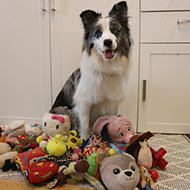
Six border collies to take part in live experiments
Scientists from the Department of Ethology at Eötvös Loránd (ELTE) University, Budapest are conducting an international research project which aims to find 'the world's smartest dog'.
The Genius Dog Challenge will see six dogs from around the world demonstrate their ability to learn the names of various toys.
The research team will be sharing the dogs' efforts with the rest of the world as part of several live broadcasts taking place from 11 November to 16 December.
The challenge will be split into two stages. For the first stage the dogs have a week to learn the names of six new toys and at the second stage the dogs will be given the same amount of time to learn the names of 12 toys.
At the end of each stage, the dogs will be tested live on the Genius Dog Challenge's Facebook and YouTube. The team aims to publish the data gathered during these live streams as a scientific article.
The project is led by Shany Dror, a PhD Student from the Department of Ethology, ELTE University. She said: “Well-trained dogs can easily learn the names of many commands such as sit or down but learning the names of objects appears to rely on different learning mechanisms.
“There is only a handful of studies conducted on dogs with a large vocabulary of object labels, such as toy names, and these studies are normally conducted on only one or two subjects.
“Our hope is that with this project we will be able to detect new genius dogs that are willing to participate in our research. We encourage owners of such dogs to contact us.”
Owners whose dogs know the names of ten or more objects or toys are invited to apply through the Genius Dog Challenge website.
Image (c) Genius Dog Challenge.



 The RCVS has announced a new version of its 1CPD mobile app, with enhanced features for veterinary surgeons and veterinary nurses to record their continuing professional development.
The RCVS has announced a new version of its 1CPD mobile app, with enhanced features for veterinary surgeons and veterinary nurses to record their continuing professional development.